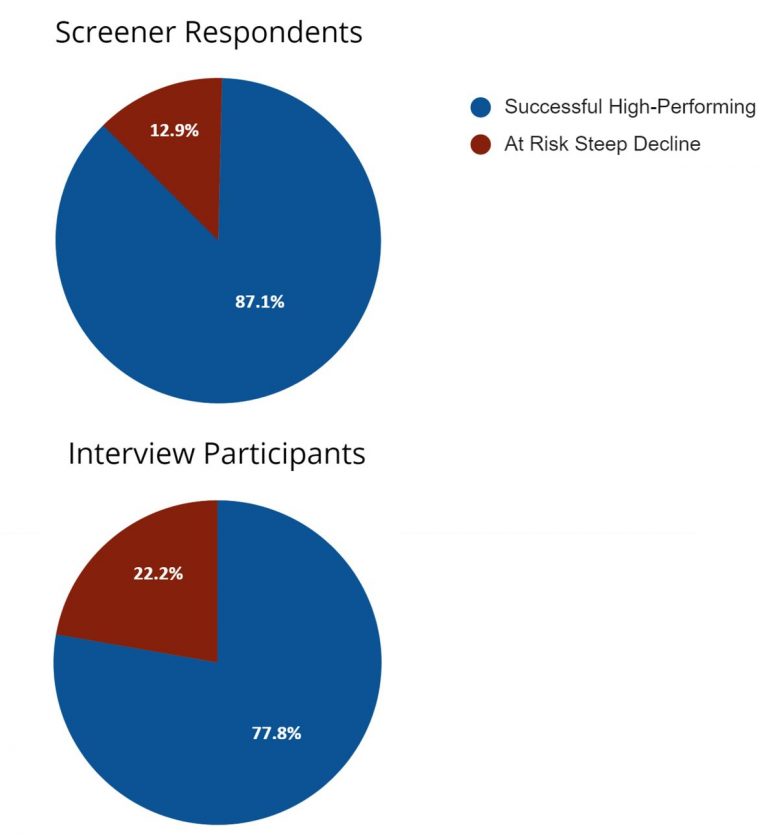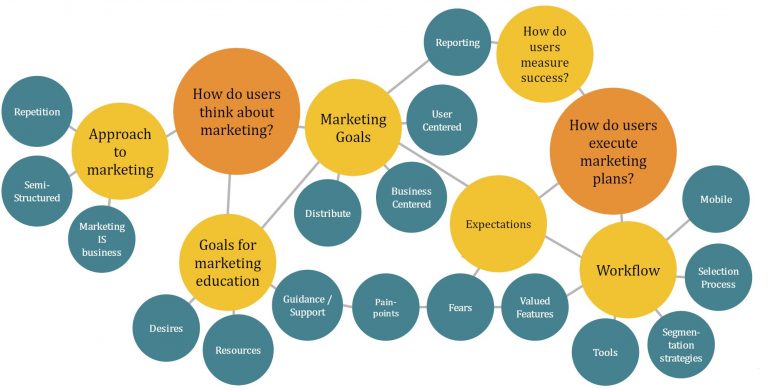Digital Marketing Platform Research
Project Overview
As part of a group project for my Field Methods (HF 780) class, our team of four students worked for a digital marketing company used primarily by small- and medium-sized businesses. Our client wanted to understand how to help their “at-risk” users become more successful.
Contextual analysis and in-depth interviews helped our team discover a discrepancy between how our client understood user success and how their clients thought about it.
My primary contributions were developing the screener and leading the thematic analysis discussions. I also contributed to the moderator guide, the final reports, and presentations, and conducted six in-depth interviews.,

Problem Statement and Research Methodology
Client-defined problem statement: How do users track return on investment and the effectiveness of their digital marketing efforts?
Revised problem statement: How do users calculate success?
Research questions:
- How do users define and measure marketing success?
- How are customers currently using digital marketing tools?
- What are users’ expectations for digital marketing products?
For this project our team started the work with a review of relevant literature. This was followed by user research consisting of:
- Contextual inquiry based on 5 customer service calls
- Distributed screener surveys to 2,335 users; received 95 responses
- Conducted 19 semi-structured interviews from the pool of respondents
The interviews were coded after completion and the team conducted thematic analysis to synthesize our findings.
During the contextual inquiry, the team observed that the business owners that comprised our client’s user base spoke about their marketing efforts in very simple terms.
As a result, we changed the language in the moderation guide to speak about marketing in layman’s terms.
Research Findings
Our participants were current customers of the client’s digital marketing platform.
- Screening survey was sent to 2355 customers; 2000 “Successful” and 335 “At-Risk”*
Screener responses: 95
- 12 were considered “At-risk – Steep Decline”
- 81 were considered “Successful – High Performing”
Interviews conducted: 19
- 3 were considered “At-risk – Steep Decline”
- 16 were considered “Successful – High Performing”
As you can see from the graphic at right, the participants we interviewed were similar to our starting sample.
*Groups classified per the client’s proprietary model.

Thematic Analysis
Compiled notes and verbatims from interviews.
Extracted & mapped findings into groups using affinity mapping:
- Planning: How did participants plan marketing tasks?
- Workflow: How did participants complete these tasks?
- Success: How did participants think about/measure success?
- Expectations: What did the participants expect from the product?
- Devices: What devices did participants use?
- User Attributes: What common characteristics did participants share?
Refined & regrouped themes.

Findings
Our research found three primary themes:
First, users of the digital marketing platform viewed our client’s platform as part of an ecosystem of tools.
Second, users are seeking help to build their marketing skills:
- Planning
- Creative inspiration
- Learning resources
Users look at a variety of metrics, but they viewed success is a feeling based on knowledge and confidence.
Perhaps most important finding was there was no difference betweeen the users our client considered “successful” and “at-risk”. While the small number of interviews with “at-risk” users is a limitation of our study, we recommended that the client do two things:
- Re-evalutate the formula of their client success metric as the current one may not account for user knowledge and confidence, which is how users define their success.
- Consider how they might package their educational offerings so that users see the firm as a resource for growing their marketing skills.
Our client found both findings compelling and planned to reconsider the components of their client success metric based on our research and planned to conduct usability research on their client education materials.